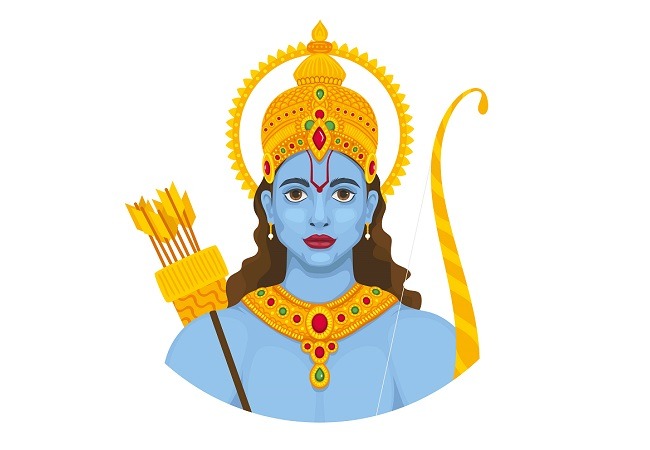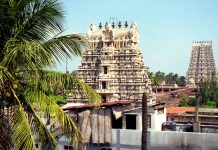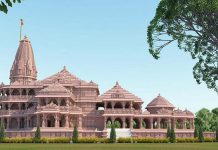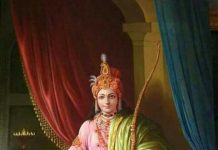
In the heart of Hindu spirituality and mythology stands Lord Rama, a central figure revered for his virtues, nobility, and embodiment of dharma (righteousness). The rich tapestry of Lord Rama’s life and teachings is interwoven with a diverse array of stories, each showcasing a different facet of his character. One way devotees honor and connect with this beloved deity is through his 108 names, each encapsulating a unique aspect of his divine essence.
Significance of the Number 108:
The number 108 holds special significance in Hinduism, Buddhism, and other spiritual traditions. It is believed to represent the universe’s entirety – 1 symbolizing the self or the divine, 0 representing emptiness or completeness, and 8 representing infinity or eternity. Chanting or reciting Lord Rama’s 108 names is seen as a profound spiritual practice that aligns one’s consciousness with the cosmos.
Exploring the 108 names of Lord Rama:
The 108 names of Lord Rama paint a vivid portrait of his attributes, roles, and the blessings he bestows upon his devotees. Here are the notable names and their meanings:
1. Adipurusha – Primordial being
2. Ahalyashapashamana – Remitter of Ahalya’s curse
3. Anantaguna – Full of virtues
4. Bhavarogasya Bheshaja – Reliever of all earthly ailments
5. Brahmanya – Supreme Godhead
6. Chitrakoot Samashraya – Creating Chitrakoot’s beauty in the Panchvati forest
7. Dandakaranya Punyakrute – One who ennobled the Dandaka forest
8. Danta – Image of serenity
9. Dashagreeva Shirohara – Slayer of the ten-headed Ravana
10. Dayasara – Embodiment of kindness
11. Dhanurdhara – One with a bow in hand
12. Dhanvine – Born of the Sun race
13. Dheerodhata Gunothara – Kind-hearted valiant
14. Dooshanatrishirohantre – Slayer of Dooshanatrishira
15. Hanumadakshita – Depends and trusts on Hanuman to fulfill his task
16. Harakodhandarama – Armed with the curved Kodhanda bow
17. Hari – The omnipresent, omniscient, omnipotent one
18. Jagadguruve – Spiritual teacher of the universe of Dharma, Artha, and Karma
19. Jaitra – One who symbolizes victory
20. Jamadagnya Mahadarpa – Destroyer of Jamadagni’s son Parashuram’s pride
21. Janakivallabha – Janaki’s consort
22. Janardana – Liberator from the cycle of birth and death
23. Jaramarana Varjita – Free from the cycle of births and deaths
24. Jayantatranavarada – Boon provider to save Jayanta
25. Jitakrodha – Conqueror of anger
26. Jitamitra – Vanquisher of enemies
27. Jitavarashaye – Conqueror of the ocean
28. Jitendra – Conqueror of the senses
29. Jitendriya – Controller of the senses
30. Kausaleya – Kausalya’s son
31. Kharadhwamsine – Slayer of demon Khara
32. Mahabhuja – Giant-armed, broad-chested lord
33. Mahadeva – Lord of all lords
34. Mahadevadi Pujita – Worshipped by Lord Shiva and other divine lords
35. Mahapurusha – Great Being
36. Mahayogine – Supreme Meditator
37. Mahodara – Generous and kind
38. Mayamanushyacharitra – Incarnation of the human form to establish dharma
39. Mayamareechahantre – Slayer of demon Tataka’s son Maricha
40. Mitabhashini – Reticent and mellifluous speaker
41. Mrutavanarajeevana – Reviver of dead monkeys
42. Munisansutasanstuta – Worshipped by sages
43. Para – The Ultimate
44. Parabrahmane – Supreme Godhead
45. Paraga – Uplifter of the poor
46. Parakasha – Bright
47. Paramapurusha – The supreme Man
48. Paramatmane – The supreme soul
49. Parasmaidhamne – Lord of Vaikuntha
50. Parasmaijyotishe – Most radiant
51. Parasme – Most Superior
52. Paratpara – Greatest of the greats
53. Paresha – Lord of the lords
54. Peetavasane – Wearing yellow attire signifying purity and wisdom
55. Pitrabhakta – Devoted to his father
56. Punyacharitraya Keertana – Subject for hymns sung in His adulations
57. Punyodaya – Provider of immortality
58. Puranapurushottama – Supreme being of the Puranas
59. Purvabhashine – One who knows the future and speaks of events to come
60. Raghava – Belonging to the Raghu race
61. Raghupungava – Scion of Raghakula race
62. Rajeevalochana – Lotus-eyed
63. Rajendra – Lord of the lords
64. Rakshavanara Sangathine – Saviour of boars and monkeys
65. Rama – The ideal avatar
66. Ramabhadra – The most auspicious one
67. Ramachandra – As gentle as the moon
68. Sacchidananda Vigraha – Eternal happiness and bliss
69. Saptatala Prabhenthachha – Rid the curse of the Seven Tale Trees
70. Sarva Punyadhikaphala – One who answers prayers and rewards good deeds
71. Sarvadevadideva – Lord of all gods
72. Sarvadevastuta – Worshipped by all divine beings
73. Sarvadevatmika – Dwells in all gods
74. Sarvateerthamaya – One who turns the water of the ocean sacred
75. Sarvayagyodhipa – Lord of all sacrificial offerings
76. Sarvopagunavarjita – Destroyer of all evil
77. Sathyavache – Always truthful
78. Satyavrata – Adopting truth as penance
79. Satyevikrama – Truth makes him powerful
80. Setukrute – Builder of the bridge over the ocean
81. Sharanatrana Tatpara – Protector of devotees
82. Shashvata – Eternal
83. Shoora – The valiant one
84. Shrimate – Revered by all
85. Shyamanga – Dark-skinned one
86. Smitavaktra – One with a smiling face
87. Smruthasarvardhanashana – Destroyer of devotees’ sins through their meditation and concentration
88. Soumya – Benevolent and calm-faced
89. Sugreevepsita Rajyada – One who recovered Sugreeva’s kingdom
90. Sumitraputra Sevita – Worshipped by Sumitra’s son Lakshmana
91. Sundara – Handsome
92. Tatakantaka – Slayer of yakshini Tataka
93. Trilokarakshaka – Protector of the three worlds
94. Trilokatmane – Lord of the three worlds
95. Tripurte – Manifestation of the Trinity – Brahma, Vishnu, and Shiva
96. Trivikrama – Conqueror of the three worlds
97. Vagmine – Spokesman
98. Valipramathana – Slayer of Vali
99. Varaprada – Answer to all prayers
100. Vatradhara – One who practices penance
101. Vedantasarea – Embodiment of the philosophy of life
102. Vedatmane – Spirit of the Vedas rests in Him
103. Vibheeshana Pratishttatre – One who crowned Vibheeshana as the king of Lanka
104. Vibheeshanaparitrate – Befriended Vibheeshana
105. Viradhavadha – Slayer of the demon Viradha
106. Vishwamitrapriya – Vishwamitra’s loved one
107. Yajvane – Performer of Yagnas
108. Yajvane – Performer of Yagnas
Deeper Spiritual Reflections:
Chanting or meditating upon Lord Rama’s 108 names serves as a means of connecting with his divine attributes and qualities. It allows devotees to contemplate the virtues he embodies, such as courage, compassion, devotion, and unwavering commitment to dharma. As one recites these names, they are drawn into the depths of Lord Rama’s story – from his birth in Ayodhya to his exile in the forest, his triumph over evil in the form of Ravana, and his eventual return as a victorious king.
Devotion and Transformation:
The recitation of Lord Rama’s names is not merely an intellectual exercise but a deeply transformative practice. It inspires self-reflection and personal growth, encouraging individuals to emulate his virtuous qualities in their own lives. By invoking his divine presence, devotees seek protection, guidance, and strength to overcome challenges and lead a life aligned with dharma.
Cultural Diversity and Devotion:
Lord Rama’s 108 names resonate across diverse cultures and regions. While some names might be more popular in certain communities or traditions, his universal appeal brings people together in reverence and devotion. Whether in India, Nepal, Southeast Asia, or beyond, his names symbolize unity in diversity and provide a common ground for spiritual seekers.
In conclusion, the 108 names of Lord Rama offer a profound avenue for spiritual connection and transformation. Each name encapsulates a distinct facet of his character, inspiring devotees to strive for righteousness, courage, and compassion. By meditating on these names, individuals not only deepen their understanding of Lord Rama but also embark on a journey toward self-discovery and inner evolution. Just as Lord Rama’s life continues to inspire countless generations, his 108 names stand as an eternal wellspring of divine wisdom and devotion.






















































